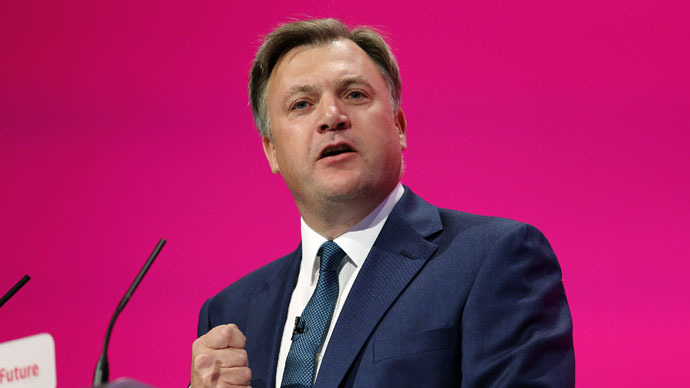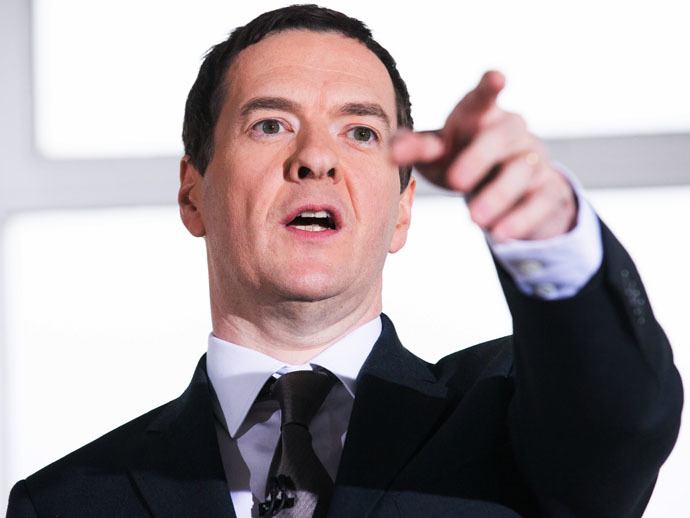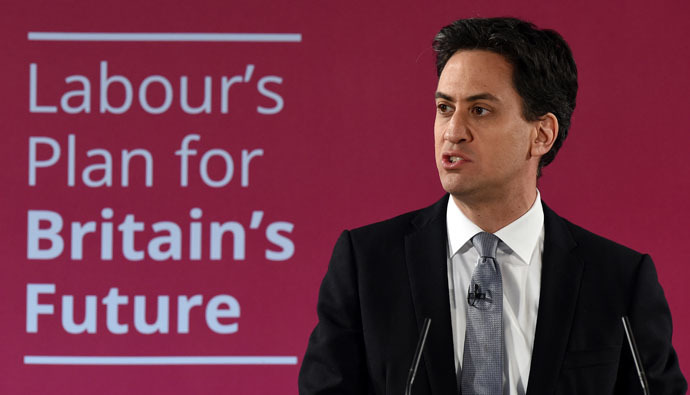Hope, not falsehood? Labour rubbishes Tory attacks, but backs further austerity

Labour will not reverse billions of pounds worth of spending cuts introduced under the current coalition to Britain’s police services, hospitals, local councils and the military if elected in May, Shadow Chancellor Ed Balls has confirmed.
Should Labour win the general election, the cuts Balls supports would slice a further £3.3 billion from local authorities’ already beleaguered budgets, take a further £700 million from the salaries of members of Britain’s armed forces and shave a further £400 million off the government’s NHS expenditure.
Balls admitted his party would pursue this path of austerity, in the wake of a heated row over a Conservative Party dossier that claimed Labour had committed to spending billions of pounds more than a newly elected government could afford to in the next parliament.
The 82-page dossier, which scrutinized Labour’s spending commitments, suggested Ed Miliband’s party wanted to spend an extra £21 billion in its first year in power.
Chancellor for the Exchequer George Osborne unveiled the controversial document on Monday as Britain’s general election campaign battle officially began.

Osborne said Labour’s spending plans were unaffordable, would risk Britain’s economic recovery, and indicated “the Labour Party have not demonstrated the fiscal discipline or economic competence that earns an opposition the credibility to form a government.”
But Balls dismissed the Conservatives' predictions as “a dodgy Tory dossier [that] is riddled with untruths and errors on every page.”
The Shadow Chancellor hit back at the Conservative attack of Labour’s economic credibility, arguing his party could not commit to overturning Britain’s public sector pay freeze or reversing council cuts in the first year after the election.
Balls acknowledged his pledge to spend no more than the Conservatives had proposed for 2015-16 would be potentially unpopular with voters. But he stressed the Tory dossier’s suggestion that a Labour government would ramp up an extra £21 billion in spending in its first year in government was politically motivated “smear analysis” based on errors and fabrication.
Following the release of the “dodgy Tory dossier,” Miliband’s party responded with a rebuttal document of their own entitled “The Tories’ Smear Analysis of Labour Party Policy.”
Balls clarified in the document that Labour ministers’ criticism of crippling public sector cuts didn’t necessarily signal their reverse in 2015-2016 under a government led by Miliband.

The Shadow Chancellor said he couldn’t pledge to reverse cuts to local authorities' budgets or offer public sector workers a rise in salary higher than the 1 percent already due to come into force in spring 2015.
Labour had, as an opposition party, previously criticized the controversial pay freeze.
The party has confirmed, however, it will back higher increases in salary for members of the armed forces, NHS workers and other public sector staff if secretaries of state can find a means of funding them by implementing cuts elsewhere.
If victorious in the upcoming general election, Labour has also promised to fund an extra 20,000 nurses and an additional 8,000 doctors with £2.5 billion generated through a ‘mansion tax’ and a levy on tobacco companies.
Balls statements came after a bruising first day of Britain’s general election battle.
While the opening of the campaign kicked off with a lofty speech by Labour leader Miliband, promising “hope, not falsehood,” it soon descended into a bitter Conservative-Labour row amid heated allegations of duplicity, lies and dirty maneuvers.
Chancellor George Osborne claimed his dossier drew from official Treasury figures and “other reliable sources.” But it later emerged the assumptions central to the document were offered by Tory advisers and the policies scrutinized stemmed from Labour commitments, ministerial comment and unfounded predictions.

Speaking to RT, UK economist and anti-austerity campaigner Michael Burke said Labour has vowed to persist with “Tory spending plans early in the next parliament” with a view to balancing Britain’s budget before 2020.
Burke, who supports UK campaign group the People’s Assembly Against Austerity, warns the next government must take strident steps to address Britain’s ongoing economic crisis.
“The crisis in the British economy remains an investment strike by the private sector, which the Coalition has deepened by cutting government investment,” he said.
“If there is no plan to increase government investment the crisis won't end. Cuts in other areas of spending will in fact make it worse.”
@Harryslaststand@DJFlo70 Labour need to reverse their policy on austerity - it doesn't help economy, just attacks the poor and vulnerable
— Heather (@heather_c_c) January 6, 2015
Burke argues further austerity under a Labour government would be irrational, and would compound the state’s economic turmoil.
“If Labour implements austerity it will look like the other social democratic parties in Europe that have done the same,” he said.
“Probably the nearest comparison would be France, where there is a deepening economic and political crisis as a result of austerity policies. It would not be rational to repeat that in Britain and to expect a different outcome.”
As the general election battle continues, the most recent YouGov poll indicates Labour are leading (34 percent), the Conservatives are a close second (31 percent) and UKIP are third (14 percent). Meanwhile, the Green Party (8 percent) have pushed the Liberal Democrats into fifth place (7 percent).












